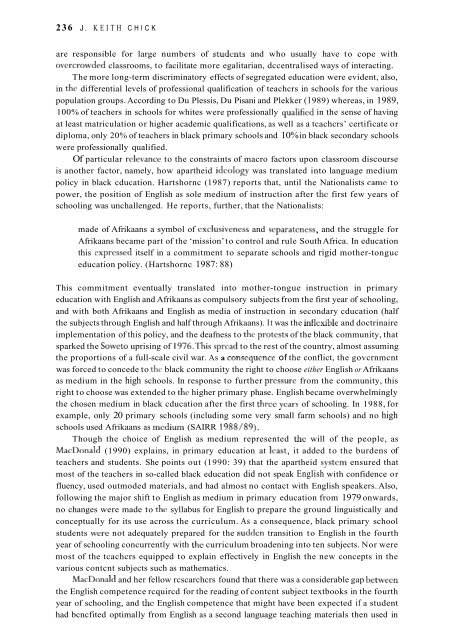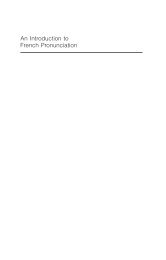English Language Teaching in its Social Context
English Language Teaching in its Social Context
English Language Teaching in its Social Context
You also want an ePaper? Increase the reach of your titles
YUMPU automatically turns print PDFs into web optimized ePapers that Google loves.
236 J. KEITH CHICKare responsible for large numbers of studcnts and who usually have to cope withovcrcrowded classrooms, to facilitate more egalitarian, dccentralised ways of <strong>in</strong>teract<strong>in</strong>g.The more long-term discrim<strong>in</strong>atory effects of segregated education were evident, also,<strong>in</strong> thc differential levels of professional qualification of teachcrs <strong>in</strong> schools for the variouspopulation groups. Accord<strong>in</strong>g to Du Plessis, Du Pisani and Plekker (1 989) whereas, <strong>in</strong> 1989,100% of teachers <strong>in</strong> schools for whites were professionally qualificd <strong>in</strong> the sense of hav<strong>in</strong>gat least matriculation or higher academic qualifications, as well as a tcachcrs’ certificate ordiploma, only 20% of teachers <strong>in</strong> black primary schools and 10% <strong>in</strong> black secondary schoolswere professionally qualified.Of particular rclevance to the constra<strong>in</strong>ts of macro factors upon classroom discourseis another factor, namely, how apartheid idcology was translated <strong>in</strong>to language mediumpolicy <strong>in</strong> black cducation. Hartshornc (1 987) reports that, until the Nationalists camc topower, the position of <strong>English</strong> as sole medium of <strong>in</strong>struction after thc first few years ofschool<strong>in</strong>g was unchallenged. He reports, further, that the Nationalists:made of Afrikaans a symbol of cxclusiveness and scparatcness, and the struggle forAfrikaans became part of the ‘mission’ to control and rule South Africa. In educationthis exprcssed <strong>its</strong>elf <strong>in</strong> a commitment to separate schools and rigid mother-tonguceducation policy. (Hartshornc 1987: 88)This commitment eventually translated <strong>in</strong>to mother-tongue <strong>in</strong>struction <strong>in</strong> primaryeducation with <strong>English</strong> and Afrikaans as compulsory subjects from the first year of school<strong>in</strong>g,and with both Afrikaans and <strong>English</strong> as media of <strong>in</strong>struction <strong>in</strong> secondary cducation (halfthe subjects through <strong>English</strong> and half through Afrikaans). It was the <strong>in</strong>flcxible and doctr<strong>in</strong>aireimplementation of this policy, and the deafness to the protcsts of the black community, thatsparked the Soweto upris<strong>in</strong>g of 1976.This spread to the rest of the country, almost assum<strong>in</strong>gthe proportions of a full-scale civil war. As a conscqucnce of the conflict, the govcrnmcntwas forced to concede to the black community the right to choose either <strong>English</strong> or Afrikaansas medium <strong>in</strong> the high schools. In response to further pressure from the community, thisright to choose was extended to thc higher primary phase. <strong>English</strong> became overwhelm<strong>in</strong>glythe chosen medium <strong>in</strong> black cducation after the first three ycars of school<strong>in</strong>g. In 1988, forexample, only 20 primary schools (<strong>in</strong>clud<strong>in</strong>g some very small farm schools) and no highschools used Afrikaans as mcdium (SAIRR 1988/89).Though the choice of <strong>English</strong> as medium represented thc will of the people, asMacDonald (1990) expla<strong>in</strong>s, <strong>in</strong> primary education at Icast, it added to the burdens ofteachers and students. She po<strong>in</strong>ts out (1 990: 39) that the apartheid systcm ensured thatmost of the teachers <strong>in</strong> so-called black education did not speak <strong>English</strong> with confidence orfluency, used outmoded materials, and had almost no contact with <strong>English</strong> speakers. Also,follow<strong>in</strong>g the major shift to <strong>English</strong> as medium <strong>in</strong> primary education from 1979 onwards,no changes were made to the syllabus for <strong>English</strong> to prepare the ground l<strong>in</strong>guistically andconceptually for <strong>its</strong> use across the curriculum. As a consequence, black primary schoolstudents were not adequately prepared for the suddcn transition to <strong>English</strong> <strong>in</strong> the fourthyear of school<strong>in</strong>g concurrently with the curriculum broaden<strong>in</strong>g <strong>in</strong>to ten subjects. Nor weremost of the tcachcrs equipped to expla<strong>in</strong> effectively <strong>in</strong> <strong>English</strong> the new concepts <strong>in</strong> thevarious contcnt subjects such as mathematics.MacDonald and her fellow rcscarchcrs found that there was a considerable gap betwecnthe <strong>English</strong> competence rcquircd for the read<strong>in</strong>g of contcnt subject textbooks <strong>in</strong> the fourthyear of school<strong>in</strong>g, and thc <strong>English</strong> competence that might have been expected if a studenthad bcncfited optimally from <strong>English</strong> as a second language teach<strong>in</strong>g materials then used <strong>in</strong>












